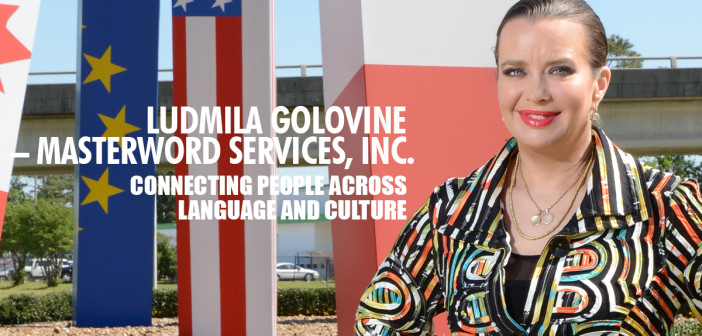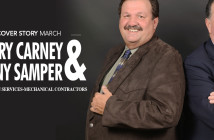“Language is the road map of a culture. It tells you where its people come from and where they are going.”
-Rita Mae Brown
There are roughly 6,500 spoken languages in the world today. Each of us talks, listens, and thinks in his/her own special language that has been shaped by our culture, experiences, profession, personality, customs, and attitudes. The chance of us meeting someone else who “talks” the exact same language is pretty remote. Building effective communication skills and relationships within a single culture is often challenging. Bridging the gap between different cultures makes building communication skills and relationships even more difficult. How fortunate it is that MasterWord Services, Inc. is a company that exists with a mission to connect people across language and culture.
In the late 1980s and early 1990s, the world was going through many changes. Communism began to falter in Poland, Hungary, and Czechoslovakia in 1988 and then suddenly, almost overnight, November 9, 1989, the Berlin Wall came down. Also in 1989, a wave of revolutions began that led to the overthrow of all of the Communist regimes of Central and Eastern Europe. In August of 1991, the Communist Party of the Soviet Union lost control. This, in turn, led to the formal dissolution of the USSR in December of 1991 and the collapse of Communist regimes in other countries such as Mongolia, Cambodia, and South Yemen. As a result of these major events, many people who had known only Communism their entire life were going through changes as well that included opportunities to leave their homeland and freely explore other societies and their ideologies. Ludmila Golovine was one of those people.
Growing up in Moscow, Russia, Ludmila (Mila) Rusakova Golovine was a very competitive student, always striving to be the best in her class. Even so, her education was limited to the subjects allowed in a Communist society. There were no words in her vocabulary for market economy, free enterprise, and democracy. Due to the fall of Communism, opportunities opened up for students to study in the United States. Graduating at the top of her class, Ludmila, who was 19 at the time, was offered a scholarship to attend the University of Houston. Excited with the opportunity to learn about a new culture, Ludmila planned to study in the United States and then return home with her newfound knowledge.
After arriving in Houston, Ludmila began her studies and chose finance as her major because she was fascinated with international finance. Even though she was fluent in Russian, French, and English, a lot of the accounting and business terminology that Ludmila was learning in college was new to her. The words didn’t exist yet in the Russian vocabulary especially since the market economy was still a new concept in Russia. Needing one more elective to get her degree, Ms. Golovine chose the Entrepreneurship class only because it was offered at a time that conveniently fit in with her schedule. The funny thing is that she had no idea what the word “entrepreneur” really meant and little did she know that the class would change her life in such a major way!
“It’s not what you tell them…it’s what they hear.”
-Red Auerbach
The Entrepreneurship class was brand new in1991 and being taught at the University of Houston’s C.T. Bauer College of Business by William “Bill” Sherrill who was not only the professor but the founder and co-chairman of the Cyvia and Melvyn Wolff Center for Entrepreneurship (WCE). A successful entrepreneur in his own right and alumnus of the University of Houston, Mr. Sherrill’s vision was to organize, expand, and promote the knowledge and practice of entrepreneurship. It was his desire to prepare students to assume leadership roles in the business world and teach them how to run their own business from the inception of an idea through its implementation
Many people had scoffed at Bill Sherrill’s idea of offering a program in entrepreneurship but it was so well-received and successful that, in 1994, Mr. Sherrill won the prestigious Ernst & Young Entrepreneurship Educator of the Year Award for his advancements in education and by 1995, the Texas State Committee for Higher Education established it as a Major in Entrepreneurship under the Bachelor of Business Administration Degree.
One of the first assignments given to Ms. Golovine for her Entrepreneurship class was to write a business plan and figure out how to run a business. Trying to come up with an idea for a business, Ludmila knew languages so she wrote a business plan on starting a language company. She came up with the name MasterWord Services and completed her business paper for the class. “That business paper ended up being my life,” expounded Ludmila. Ultimately, not only did Ludmila take this class, she stayed for the entire program and graduated with a double major in Finance and Entrepreneurship.
At the time of her first class, Ludmila had no idea of all of the diversity in Houston but the more she studied and discovered things about Houston, the more she became excited about her business idea. According to one recent Rice University study, the U.S. Census data shows that Houston has now surpassed New York City as the country’s most racially and ethnically diverse metropolis. More than 90 languages are spoken throughout the Houston area and 92 countries have consular offices in Houston.
Ms. Golovine reflected, “What is interesting is that today, when we think about working internationally, it doesn’t necessarily mean going overseas. We can be working internationally when we are right here in the city. Not only are our domestic clients international, our domestic workforce is international as well. So it is extremely important for us to learn to embrace each other’s cultures and differences when we try to communicate with our customers both internationally and domestically.”
“If you talk to a man in a language he understands, it goes to his head. If you talk to him in his own language, it goes to his heart.”
-Nelson Mandela
While still enrolled in the Entrepreneurship Program, Ludmila decided to take her idea and put it into action. So in 1993, MasterWord Services, Inc. was founded by Ms. Golovine where she took on the role of CEO and President. “The program was truly amazing because not only did we have the teachers but they invited entrepreneurs and business owners to come and talk about the issues and challenges of running a business, things to do, things not to do, etc.,” recalled Ms. Golovine. “The company was my project. At first, I was the only employee, and then the business grew little by little. We kept adding languages and, today, we support our clients in over 250 languages and we support clients based in over 50 countries.
Ludmila didn’t start out with a marketing budget, so after reading the book, “Guerrilla Marketing” (about doing marketing without a budget), she learned that the best way to market is by doing an excellent job and always exceeding the clients’ expectations every step of the way. Ms. Golovine elaborated, “When you do an excellent job for your clients, they will spread the word and also return when they need your services again. My very first client was a geophysical company from Russia that hired me as an interpreter. I met them at a conference that was hosted at the University of Houston. The very first contract I signed was with the largest petroleum company in the world. Next, we worked with Pennzoil and NASA. After that, the rest is history.”
“There are four ways, and only four ways, in which we have contact with the world. We are evaluated and classified by these four contacts: what we do, how we look, what we say, and how we say it.”
-Dale Carnegie
Little by little, MasterWord Services grew. Eventually, they started working with hospitals and doctors in the medical center. All the while, Ludmila did everything she could to make connections including attending professional conferences, networking events, and anything that had the word “international” in it. The challenge at the time was that she was a “one-woman-show” and was also running everywhere to do the interpretations. As a result, Ms. Golovine was working 18 to 20 hours a day. Initially, afraid to hire her first employee, when Ludmila did finally hire someone, the employee would come for her paycheck at the end of every workday because she had so little of confidence that they would still be in business the next day!
As her business grew, Ms. Golovine partnered up with another small translation company but after a couple of years bought them out. Throughout the time that MasterWord Services was growing, Ms. Golovine continued being coached by the great people at the Entrepreneurship Center. She is most appreciative of mentors Bill Sherrill, founder and Co-Chairman of the Wolff Center for Entrepreneurship; Frank W. Kelley, Associate Dean for Undergraduate Studies in the Bauer College of Business who at one point worked as the COO at MasterWord Services; Ken Jones, Associate Director of the Wolff Center for Entrepreneurship at the C. T. Bauer College of Business; Dave Cook, Director of Mentoring Programs for the Wolff Center for Entrepreneurship at the C. T. Bauer College of Business; and Linda McIngvale, owner of Westside Tennis & Fitness.
It was Linda McIngvale who introduced Ludmila to the Deming Method that helped her to create and install the systems in her company. The works of Dr. W. Edwards Deming focuses on quality and continual improvement which lead to MasterWord Services seeking and obtaining ISO certification. Very few companies in the language services industry have ISO Certification. ISO stands for the International Organization for Standardization and MasterWord is ISO 9001:2008 Certified which meets all the requirements of a quality management system. This certification ensures that their products and services consistently meet their customer’s requirements and that quality is continually improved.
One of the best words of advice that Ms. Golovine ever received was, “Try to get your line of credit when you don’t need it.” Actually starting with a line of credit when it wasn’t needed was very helpful. It was around $10,000. “I pledged everything we had and didn’t have in order to get it. It was based on receivables. From that point, the banking relationship grew. We were with the same banker until he retired. That long term continuity helped tremendously,” remarked Ms. Golovine, “I also learned from the Business Center that the banking relationship is one of the most important ones that you have besides your clients so one of the key points is that we are very open in the way we work with our bankers. We basically report to them every month, or every quarter, or as often as they want. We let them know what our plans are, how we are performing, what the upcoming challenges are, what our line of credit needs will be, etc.”
At the time that Ludmila came up with her business plan after doing the market research, the industry was about $10 billion. Today, it’s about $35 billion. The largest company in the industry at that time was Berlitz and their annual revenue was around $100 to $150 million. Also, the industry was extremely fragmented which still holds true. There are a whole bunch of “mom and pop” shops but there are not that many companies in the mid-market or ones that are the real big players in the market. Even today, there are just a handful of really large companies while the rest are very small.
When Ms. Golovine first drove to where the company is currently located, there were a lot of cow pastures around and the area was called “Grasshopper Square”. She shrewdly purchased the building for a very reasonable price. It wasn’t long thereafter that the area exploded and is now in the center of the “Energy Corridor”. MWS has 130 full time employees, 12,000 contractors with whom they work, and over 250 languages in which they work. By other industry standards, they would be considered a small business, but in their industry, they are one of the top ten in North America! The main focus has always been how they can do the absolutely best job for what the client needs. There has never been a limit of what they can customize or where they can go above and beyond to meet the clients’ needs. They always do the best they can to be very flexible and creative with the client who calls them with a tight deadline or needs something ‘yesterday’, even if they need an interpreter for a language that no one has ever heard of.
“To have another language is to possess a
second soul.”
-Charlemagne
For example, when they do work for the medical center, they provide interpreters for over 250 languages. These interpreters must first go through training and be Joint Commission compliant. Every detail is painstakingly researched in making sure all of the hospital requirements are fulfilled including background checks, trainings, flu shots, and vaccinations. They may even get a call for a very rare language like Dinka or Quiché (a Mayan language of Guatemala).
MasterWord has four divisions. There is a division that focuses on interpreting (verbal communication) and works mostly domestically. They do a lot of work with the healthcare industry, schools, child protective services, and courts. This division provides interpreters for face-to-face, over the phone, and video remote interpreting. Another division is the translation department that deals with the written word. This group does a lot of international work that includes the oil and gas industry, engineering firms, law firms, and banks. The next division is called on-site solutions. They staff teams of linguists on-site domestically and internationally on different projects. The final division is the training and assessments department that has arisen out of the need for evaluating the skills of interpreters and translators. This group provides comprehensive training programs including a 40 hour course for medical interpreters.
In addition, MasterWord Services offers cross-cultural training that is country specific and a cross-cultural training competency toolkit for doctors and healthcare workers to help them interact with whomever may walk through their door. This training specifically teaches them how to build rapport and establish communication with each culture. MWS also provides American Sign Language interpreters and CART services. One MWS employee is the President of the Greater Houston Interpreters for the Deaf.
Ms. Golovine elaborated on how important it is for translations to be very accurate, “When you are dealing with medical documents or highly technical engineering documents, one mistake can mean a loss of life or a huge technical problem. Your communication is only as good as your translator. You can be very prepared for that business meeting and presentation but if you didn’t take the time to accurately translate your PowerPoint slides and have a good interpreter, you won’t come across prepared. When your overseas counterparts are validating your business, validating you as a partner, and evaluating your technology and tools, it’s very important that you bring an interpreter with you who is good and knowledgeable. The same thing applies to medical and legal settings. You need to have an interpreter who knows the subject matter they are interpreting.”
“One language sets you in a corridor for life. Two languages open every door along the way.”
-Frank Smith
Always a trendsetter in employee relations and how quality, integrity, and attention to details are reflected in everything they do, MasterWord Services has received countless awards and recognition including:
• Houston Chronicle Top Workplace (2013)
• One of the “10 Largest Language Services Providers in North America” (Common Sense Advisory)
• One of the “50 Largest Language Services Providers Worldwide” (Common Sense Advisory)
• Top 100 Woman-owned business in Texas (DiversityBusiness.com)
• Top 500 Woman-owned business in the United States (DiversityBusiness.com)
• ISO 9001:2008 certification
The MWS Houston office is a wonderful example of how diverse cultures can work well together as a family. They have people working there from 20 different countries including Honduras, Madagascar, Russia, El Salvador, China, and Vietnam! Last year, the Houston Chronicle’s annual special report recognized MasterWord Services, Inc. as one of Houston’s top 150 workplaces based on employee surveys. Ludmila considers this the greatest of compliments and a testimony to how she always tries to create a fun, multi-cultural environment amongst her employees despite their work being fast-paced and stressful at times.
Another reason that the employee morale is so high is because the company provides a lot of training for its employees. This year, they are teaming up with the Center for Entrepreneurship in training their management team on how to write a business plan because every division is pretty much its own business. They participate in a lot of different training to improve leadership skills and sales techniques including training with the Demartini Institute and neurolinguistic programming (NLP), a very interesting tool for building rapport and enhancing communication.
They are also bringing in tools to the office in dealing with stress. They have “Mindful Mondays” which is a type of employee wellness program that provides tips on meditation, yoga, and relaxation techniques. Ludmila fully embraces this principle about bringing mindfulness to work in everything she does. She makes sure that they recognize employee’s birthdays, celebrate different holidays from around the world, have office parties with everyone bringing international foods, share cultural tidbits during their Friday staff meeting where they learn about different traditions and cultures, and continuously offering opportunities for the employees to learn something new.
“For me, words are a form of action, capable of influencing change.”
-Ingrid Bengis
Two years after Ludmila arrived in Houston her mother came here as well. She is a scientist who deals with applied physics and works for the Texas Center for Superconductivity. In addition, Ludmila has three children who by choice are learning both Mandarin Chinese and Spanish in school. “It’s quite an interesting combination at home,” expressed Ms. Golovine.
Actively involved in the community, Ms. Golovine is a member of many organizations that include:
• Cyvia and Melvyn Wolff Center for Entrepreneurship at the University of Houston
• Greater Houston Partnership
• US-Russia Chamber of Commerce
• American Translators Association
• National Council on Interpreting in Healthcare
• Houston Interpreters and Translators Association
• Small Business Today Magazine Publisher’s Advisory Board
• The Charter 100
• WBEA (Women Business Enterprise Alliance)
• NAWBO (National Association of Women Business Owners)
• NAPW (National Association of Professional Women)
• Friends of Integrative Medicine at the University of Texas MD Anderson Cancer Center
• The Rothko Chapel
Ms. Golovine has no plans in slowing down. MasterWord Services is something she enjoys doing every moment. With the deepest sincerity in her voice, she said, “I don’t work a minute in my life because when you love what you do, it’s not work.” Ms. Golovine’s plans for the future are to continue to grow and because of the systems she has set in place and her world-embracing philosophy, she will be the yardstick by which others in her industry will be measured. This statement truly reflects Ludmila’s goals, “Our mission is to connect people across language and culture and we want to make sure that we are that connecting force that unites our global village here in Houston, throughout the United States, and around the world.”




